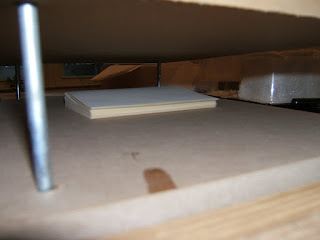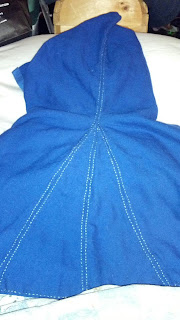So, now that the text block was assembled and being pressed, with the measurements I took off of it (with the book board thickness included in that), it was time to start the embroidery.

I bought a half yard of burgandy silk dupioni fabric that had very little slubbing in the weave. Was actually quite pleased with this as I found it at Joanne's and usually their dupioni is pretty slubby.
At the same time I purchased burgandy linen to match. I felt if I embroidered directly onto the silk with nothing behind it, it wouldnt be strong enough and the stitching would pull through or bunch up the fabric showing more of the needle holes.
I used the scroll frame pictured here to do all the embroidery.
Design...let me speak on that for a moment. Other than the "E", I had free reign to do what I wanted. Since I was told this was a gift for someone (and I still do not know who), I wanted to make the design so that it was appropriate for either a male or female. I did a lot of searching online at medieval embroidered book covers and found a lot of resources and images. This database from The British Library was exceptionally helpful:
This 16th century binding was a big inspiration for me:
I decided that tudor roses would be appropriate for either gender and to throw in a little bit of myself into it, I added a grape cluster and ivy. If you know me, you know I love grapes. :D
With a tape measure and the measurements from the text block, I measured out the spacing for the embroidery for front, back and spine of the book. Then with a ruler and a fabric pencil, I drew in the outline of the book cover and then started sketching the design.
Then I basted the linen to the back of the silk.
This is a close up of the sketching for the front cover with his requested "E" on it.
And of course the back cover.
I began embroidering the "E" as i was still waiting on cards of silk floss to arrive in varying shades of purple for the grapes. I used split stitch to embroider and fill the letter in.
When the purple silks arrived and after the completion of the letter, I began the grapes using three tones of purple for the grapes and two tones for the leaves, again using split stitch. I went with this stitch mostly because a book gets handled quite a bit and the split stitch would be the least snagging and most durable to cover a book, in my opinion and was what is primarily used on covers in history.
The finished grapes now outlined in their gold frame. Then next i framed out the covers and started in on the roses.
Next I began adding ivy work growing from rose to rose.
And here is the completed embroidery. but...in my opinion, it still needed something. Then I figured it out....
SPANGLES!!! :D I discovered I still had a small pouch of gold spangles in my supplies so I "speckled" them around and tacked them down with some silk floss.
Thus completes the embroidery.
Part 3: attaching cover to the text block.




















































